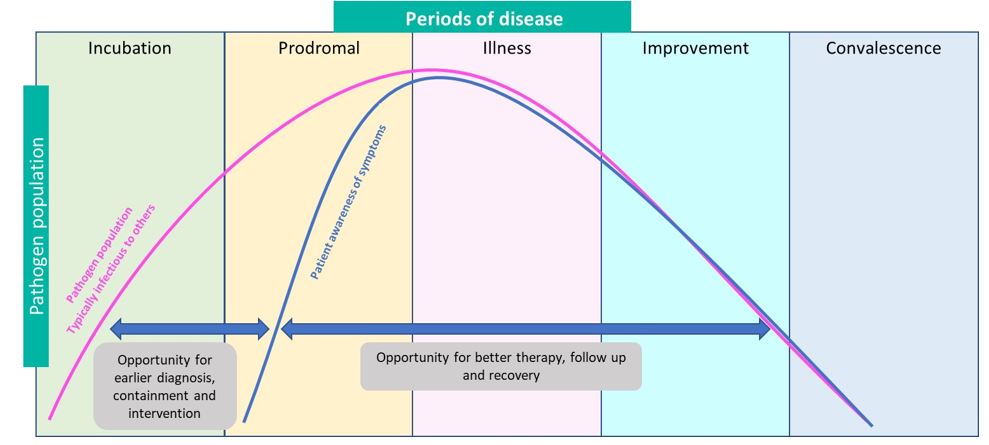Prodromal Symptoms: Early Warning Signs
Introduction: In the realm of health and wellness, early detection plays a pivotal role in prevention and intervention. Enter prodromal symptoms, the subtle yet significant indicators that precede the full onset of certain health conditions. This comprehensive guide aims to shed light on prodromal symptoms, their importance, and how recognizing them can potentially lead to timely healthcare interventions.
Common Types of Prodromal Symptoms:
Prodromal symptoms encompass a wide spectrum of early warning signs that hint at the impending onset of health issues. They manifest across various domains, including neurological, psychological, and infectious. While they may vary from one condition to another, recognizing common patterns in these categories can be crucial in identifying potential health concerns.

Recognizing Prodromal Symptoms: Key Indicators to Watch For:
Learning to identify prodromal symptoms can empower individuals to take proactive steps towards their well-being. These early indicators often present subtly and may be mistaken for transient discomfort. However, understanding these key indicators is essential in discerning when to seek further medical evaluation.
The Role of Prodromal Symptoms in Disease Prediction:
Prodromal symptoms are like nature’s early alarms, alerting us to potential health storms on the horizon. Their significance lies in their ability to serve as precursors to more pronounced health conditions. By recognizing and interpreting these signs, individuals and healthcare professionals can intervene early, potentially mitigating the severity of the condition. Understanding the relationship between prodromal symptoms and the diseases they foreshadow can lead to improved health outcomes and a proactive approach to well-being.
Diagnostic Challenges and Considerations:
While prodromal symptoms provide valuable insights, diagnosing underlying conditions solely based on these early indicators can be intricate. Many prodromal symptoms are nonspecific and can overlap with various health issues. This complexity underscores the importance of consulting healthcare professionals for accurate assessments. Diagnoses often require a comprehensive evaluation that considers medical history, physical exams, laboratory tests, and other diagnostic tools. Seeking professional guidance is crucial to ensure accurate diagnoses and appropriate treatment plans.
Importance of Seeking Medical Attention:
The importance of consulting a medical professional when prodromal symptoms are observed cannot be emphasized enough. Early intervention can significantly impact the course of a condition and improve treatment outcomes. Ignoring or downplaying prodromal symptoms might lead to delayed diagnoses and missed opportunities for timely care. A healthcare provider can offer expert insights, conduct necessary tests, and guide individuals towards the appropriate steps to manage their health.
Conditions Associated with Prodromal Symptoms:
Prodromal symptoms are often the first whispers of various health conditions across different domains. In mental health, they might manifest as changes in mood, sleep patterns, or cognitive functions. Infectious diseases may be heralded by flu-like symptoms or unexplained fatigue. Neurological disorders can reveal themselves through subtle sensory changes or disruptions in motor function. Recognizing these associations empowers individuals to prioritize their health and seek timely medical evaluation.
Prevention and Early Intervention Strategies:
Harnessing the potential of prodromal symptoms for prevention and early intervention requires proactive measures. Engaging in regular health check-ups, adopting a healthy lifestyle, and staying attuned to changes in the body can aid in identifying prodromal symptoms. If identified, seeking medical attention promptly allows for comprehensive evaluations and targeted interventions. Prevention efforts, guided by these early warning signs, can lead to improved outcomes and a better quality of life.
Future of Prodromal Symptom Research:
As medical knowledge advances, so does our understanding of prodromal symptoms. Ongoing research aims to uncover novel associations between these early indicators and emerging health conditions. Innovative diagnostic tools, including biomarkers and predictive algorithms, are being explored to enhance the accuracy of diagnosis based on prodromal symptoms. The future holds promise for refining the predictive power of prodromal symptoms and transforming healthcare interventions.
Frequently Asked Questions About Prodromal Symptoms
What are prodromal symptoms?
Prodromal symptoms are early warning signs that precede the full onset of a health condition. They can include subtle changes in physical, emotional, or cognitive well-being.
Why are prodromal symptoms important?
Prodromal symptoms provide an opportunity for early intervention and prevention. Recognizing these signs can lead to timely medical attention and improved health outcomes.
Do all health conditions have prodromal symptoms?
Not all health conditions have prodromal symptoms, but many do. They can vary depending on the specific condition and individual characteristics.
Can prodromal symptoms be mistaken for something else?
Yes, prodromal symptoms can sometimes be mistaken for transient discomfort or unrelated issues. Consulting a healthcare professional is crucial for accurate assessment.
Are prodromal symptoms the same for everyone?
Prodromal symptoms can vary from person to person and based on the condition. Some individuals may experience specific indicators, while others might have different ones.
Can prodromal symptoms be prevented?
While prodromal symptoms themselves may not always be preventable, their associated health conditions can often be managed with early intervention, lifestyle changes, and regular medical check-ups.
Should I be concerned if I experience prodromal symptoms?
Experiencing prodromal symptoms doesn’t necessarily indicate a serious health issue, but it’s wise to consult a healthcare professional for proper evaluation and guidance.
Can prodromal symptoms resolve on their own?
Some prodromal symptoms might resolve on their own, but it’s important not to dismiss persistent or concerning signs. Seeking medical attention can help determine their underlying cause.
Can prodromal symptoms be a sign of multiple conditions?
Yes, prodromal symptoms can overlap among different health conditions. A comprehensive medical evaluation is necessary to accurately diagnose the underlying cause.
Conclusion:
In the intricate web of health, recognizing prodromal symptoms emerges as a powerful tool for prevention and intervention. Understanding these early warning signs empowers individuals to take charge of their well-being. By collaborating with healthcare professionals and staying vigilant about changes in the body, we can harness the potential of prodromal symptoms to pave the way for proactive health management. Embracing these subtle yet significant signals is an investment in a healthier, more resilient future.




